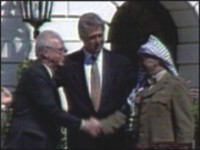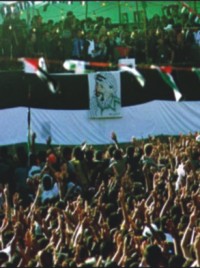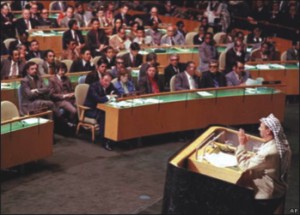|
Tribute
Arafat
Dies, Palestinian Dream Remains Unfulfilled
Yasser
Arafat was born Muhammad Abdul Rahman Abdul Raouf Arafat al-Qudwa
al-Husseini on 24 August 1929 in the Egyptian capital, Cairo.
His father, a Palestinian merchant living in Egypt, died during
the first Arab-Israeli war 20 years later.
Arafat's
youth is surrounded by uncertainty. He claimed to have been
born in Jerusalem but his Egyptian accent always revealed
his Cairo upbringing.
 The
young Arafat is thought to have adopted the name Yasser --
and its epithet "Abu Ammar" -- while studying at
university in Egypt, to honour an Arab victim of the British
mandate in Palestine. From the beginning, Arafat was a powerful
grassroots activist. Initially, he was drawn towards Egypt's
Muslim Brotherhood, but soon became wedded to the idea of
armed struggle to reverse what the Palestinians call the 1948
Catastrophe. The
young Arafat is thought to have adopted the name Yasser --
and its epithet "Abu Ammar" -- while studying at
university in Egypt, to honour an Arab victim of the British
mandate in Palestine. From the beginning, Arafat was a powerful
grassroots activist. Initially, he was drawn towards Egypt's
Muslim Brotherhood, but soon became wedded to the idea of
armed struggle to reverse what the Palestinians call the 1948
Catastrophe.
That was
when the state of Israel was established on more than 70%
of Palestine, excluding what is now Jordan, which had been
under British rule.
At some
point after 1948, Arafat secretly founded Fatah, the Movement
for the Liberation of Palestine, with a few like-minded Diaspora
Palestinians, to achieve that reversal. Arafat later spoke
proudly of these days, when he salvaged World War II rifles
from the Egyptian desert to arm his organisation. Arafat's
style was often theatrical. In 1953 he sent Egypt's first
post-revolution leader, General Muhammad Neguib, a three-word
petition: "Don't forget Palestine." The words were
said to have been written in Arafat's own blood.
Arafat's
CV said that in 1956 he was commissioned as a lieutenant in
the Egyptian army and he served during the Suez crisis and
the Arab-Israeli war which followed. The expertise, which
Arafat gained in explosives and demolition, prepared him for
his role as the head of Fatah's military wing, al-Asifa -
the Storm - which started operations in 1965.
Al-Asifa's
job was to launch guerrilla attacks against Israel, mainly
from Jordan, Lebanon and Gaza, which was then under Egyptian
control. After Israel's 1967 crushing defeat of the Arab armies
and its capture of the West Bank and Gaza, Fatah was the only
credible force left fighting Israel. Arafat's reputation was
enhanced in 1968 with his courageous defence of the Jordanian
town of Karameh against superior Israeli forces.
Karameh
-- which means "dignity" in Arabic -- caused a surge
of optimism among Palestinians and raised the banner of Palestinian
national liberation in contrast to the failure of the Arab
regimes to challenge Israel. In 1969, Arafat was voted chairman
of the executive committee of the Palestine Liberation Organisation
(PLO), which had been formed four years earlier by the Arab
League. Initially based in Jordan, PLO fighters were driven
out by King Hussein in September 1970 -- later dubbed Black
September. Arafat led them to the Lebanese capital, Beirut.
 In
subsequent years, guerrillas from various Palestinian factions
hit the headlines with hijackings, bombings and assassinations,
most notably the kidnapping and killing of 11 Israeli athletes
at the 1972 Munich Olympics. In
subsequent years, guerrillas from various Palestinian factions
hit the headlines with hijackings, bombings and assassinations,
most notably the kidnapping and killing of 11 Israeli athletes
at the 1972 Munich Olympics.
Arafat
refused to discuss such attacks, though he has always denounced
terrorism as a tactic. Whether or not he was personally involved
remains a matter of conjecture. In 1974 Arafat made a dramatic
entrance on the international diplomatic stage. Addressing
the United Nations General Assembly in New York, he told delegates
that he had come "bearing an olive branch and a freedom
fighter's gun -- do not let the olive branch fall from my
hand".
In the
1970s, the Palestinians were establishing a "state-within-a-state"
in Lebanon, which destabilised the country as they used it
as a launch pad for attacks on Israel.
In 1982,
Israeli Defence Minister Ariel Sharon launched his controversial
invasion of Lebanon to drive out the PLO. This resulted in
the expulsion of Arafat -- this time far from Israel's borders
to the North African State of Tunisia.
This was
the start of years of isolation that, in 1987, became more
acute with the outbreak of the Palestinian uprising, or intifada,
in the Israeli-occupied West Bank and Gaza. But one of Arafat's
great skills over the decades was his ability to harness the
Palestinian revolution, and he managed to identify the unarmed,
stone-throwing challenge to the occupation with his own leadership
-- though its origins had little to do with him.
Supposedly
wedded exclusively to the Palestinian cause, Arafat -- a Sunni
Muslim -- surprised the world in 1991 when he married Suha
Tawil, from a prominent Christian Palestinian family, with
whom he had a daughter, Zahwa. But the nuptials came at a
low point in Arafat's revolutionary career.
Having
ridden the intifada for four years, he had made a critical
mistake in 1990 by supporting Saddam Hussein during his invasion
and occupation of Kuwait. Support in the Gulf States dried
up, the Palestinian cause was never so marginalised and Arafat
had no choice but to make peace with Israel from a position
of weakness.
 On
13 September 1993, Arafat and Israel's Prime Minister, Yitzhak
Rabin, appeared on the White House lawn after secret talks
facilitated by Norwegian diplomats. The two sides signed the
Declaration of Principles, an agreement allowing Palestinians
self-rule in the Gaza Strip and the West Bank town of Jericho
in return for the PLO's recognition of the Jewish state. On
13 September 1993, Arafat and Israel's Prime Minister, Yitzhak
Rabin, appeared on the White House lawn after secret talks
facilitated by Norwegian diplomats. The two sides signed the
Declaration of Principles, an agreement allowing Palestinians
self-rule in the Gaza Strip and the West Bank town of Jericho
in return for the PLO's recognition of the Jewish state.
But such
fundamental issues as Jewish settlements on occupied land,
the future of Palestinians who were made refugees in 1948
and the future of Jerusalem were left undecided. Though Arafat
returned in triumph to Gaza the following year, the peace
process was fraught with difficulties.
Rabin
was assassinated in November 1995 and, as President of the
Palestinian National Authority, Arafat struggled to define
his role and keep Israelis and Palestinians committed to what
he termed the "peace of the brave". By 2000, the
Oslo peace process had come to a dead end.
Arafat
was blamed by Israel and the US for the failure in July that
year of the peace talks at Camp David. He insisted though
that the deal he was offered was far less generous than it
has since been portrayed, and, as he put it, "the Arab
leader has not been born who would give up Jerusalem".
A new
intifada -- now armed, with Arafat at its heart -- was launched
in the West Bank and Gaza. Matters came to a head in December
2001 when, following a wave of suicide attacks, the Israeli
government -- led by Arafat's old adversary Ariel Sharon --
blockaded him in his West Bank headquarters, accusing him
of instigating the terror on Israel's streets.
Meanwhile,
the explosion of pent-up anger of Palestinians who had lost
faith in the peace process, and in Arafat's leadership, fed
the ongoing violence. Suicide bombings brought severe Israeli
retribution, which trapped and isolated Arafat in the ruins
of his bombed-out headquarters in Ramallah. Arafat died on
November 11 in a French hospital in Paris.
This
article was first published on bbcnews.com
Copyright
(R) thedailystar.net 2004
| 